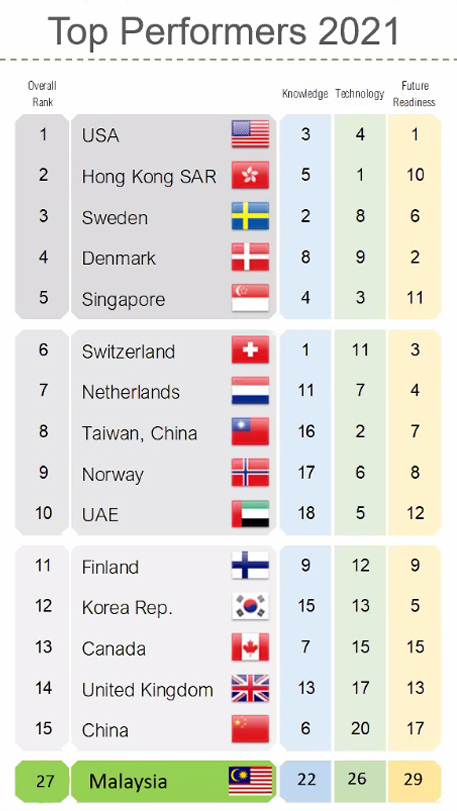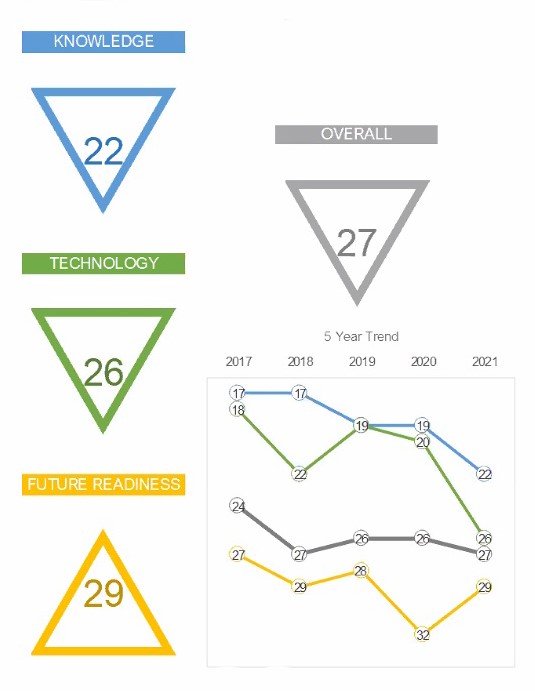Why ESG should really read GES
The governance aspect of ESG is a fundamental driver of environmental and social quality. Our experts outline the methodology required to ensure board-level leadership in sustainability....
3 November 2021 • by Arturo Bris, Misiek Piskorski in Videos
Investment in digital hardware and a long history as a manufacturer and exporter of high-tech goods has long given Malaysia strong digital fundamentals. ...
Decades of electronics investment from multinational business and a forward-looking government through the 1980s and 1990s have prepared Malaysia well for the digital era. Indeed, in the latest IMD World Digital Competitiveness Ranking, issued in September, Malaysia came in at 27th – just behind Estonia and Belgium and ahead of Japan and Lithuania

Yet, as noted by the participants in an IMD-organized virtual roundtable on Malaysia’s digital competitiveness held on 2 November, the country is going to have to move to the next level: Malaysia’s ranking has dropped three places in the last four years, pointing to a weakening performance compared with its peers.

Chaired by Misiek Piskorski, Dean of IMD Southeast Asia and Oceania and Professor of Digital Strategy, Analytics and Innovation, the roundtable focused on the next steps Malaysia should take to up its digital game.
Malaysia’s strengths lie in its technology knowledge base, said Arturo Bris, Professor of Finance at IMD and since January 2014 head of its World Competitiveness Center, which compiles the index.
Bris highlighted the diversity of the country’s technology talent base, with its high number of science graduates, women with degrees and female researchers.
Holding the country back, however, were shortcomings in its general regulatory framework and digital infrastructure. Starting a business is harder than it should be, immigration laws prevent talent from entering. Software piracy also remains an issue.
Yet Malaysia also has the potential to advance rapidly, as both Bris and the roundtable’s other participants noted.
“We’ve made a lot of inroads, but much remains to be done,” said Mahadir Aziz, who in September became CEO of Malaysia Digital Economy Corporation (MDEC), the country’s lead agency for digital transformation.
Pointing to the need to spread digitization more widely is the fact that that e-commerce yet to take off to the same degree as it has in many other parts of Asia.
While funding is flowing into the country, it needs to be paired with greater expertise: “We’re attracting investment, but we also need to attract more venture capital,” Aziz said.
To help startups struggling to cope in the COVID-19 environment, MDEC in 2020 launched its Investor Matching platform to bring investors and new companies together both for funding and to provide support such as mentoring and strategic partnerships.
In Malaysia’s favour is the strong information backbone already in place, including 640,000 kilometres of fibre optic cable, said Imri Mokhtar, Managing Director and Group CEO of Telekom Malaysia, the country’s state-owned provider of telecoms, broadband and broadcasting services.
Such achievements, with their emphasis on investment, reflect the fact that public-private partnerships are an area where Malaysia ranks well above average.
Now, however, the country and corporations such as Telekom Malaysia have to shift their focus from hardware to people, and to ensuring the inclusion of groups until now excluded from the digital economy.
“What’s lacking, and what we hope to address in the next budget, is to look at the informal and micro sectors,” said Aziz. “The question is how to bring [their digitization] up to the same level as the rest of the economy.”
This means not just doing the big projects, but working down at granular level where digitization can really make a difference for micro-entrepreneurs, especially those in rural areas and on the margins of the formal economy. “Now we have to extend to more rural areas to bridge the country’s digital and economic divides,” said Mokhtar.
COVID-19 has played a major role in reshaping views, with the last two years seeing many people embrace new ways of working – first and foremost at small and medium-sized enterprises (SMEs), said Mokhtar.
“This has been a golden window [for digitization] to take off with them, especially as it’s been supported by the government with its SME digitization fund,” said Mokhtar.
The key, suggested Bris, lies with the government. “Those countries that excel in transforming their country digitally have done so with a top-down approach.”
“In the United States, as we know, most digital initiatives were originally funded either by the military or the government. Now, that’s also the case in China, where the digital transformation has huge support from the central government,” said Bris.
“Any successful digital transformation has to start with an institutional approach, and the key to that typically is political leadership. Very often you see in countries where digital transformation has become a reality, it is a result of a proactive leadership – as we’ve seen in Israel, Estonia and Argentina.
Another area of government support should be making sure Malaysia’s talent advantage is maintained. “Attracting and retaining the talent is going to be paramount,” said Bris.
Part of that will call for further investment in training. But perhaps of more importance will be thinking big. “Ambitious plans can help attract and excite people,” said Aziz. “We have a long inventory of IT companies. We’re gaining more skills. What we need is a catalytic project.”
With such a framework in place, the market can take over. Private companies can innovate and address the wishes of people to become more digital across all aspects of their life.
“Covid-19 opened up opportunities for digital innovation. Now we have to come up with things that attract people and companies to come here,” said Aziz.
“I think we’re at the brink of a really rapid shift to embracing a much more digital way of life,” said Mokhtar. “This is not just about technology. It connects to the future readiness of the country. We’ve seen [wanting] that accelerate over the past one-and-a-half years as the country’s trajectory moves to recovery and growth.”

Professor of Finance at IMD
Arturo Bris is Professor of Finance at IMD. Since January 2014, he has led the world-renowned IMD World Competitiveness Center. At IMD, Bris directs the Boards and Risks, Strategic Finance, and Navigating Fintech Innovation and Disruption programs. He also previously directed the flagship Advanced Strategic Management program between 2009 and 2013.

Professor of Digital Strategy, Analytics and Innovation and the Dean of IMD Asia and Oceania
Mikołaj Jan Piskorski, who often goes by the name Misiek, is a Professor of Digital Strategy, Analytics and Innovation and the Dean of IMD Asia and Oceania. Professor Piskorski is an expert on digital strategy, platform strategy, and the process of digital business transformation. He is Co-Director of the Digital Strategy, Analytics and AI program.

Managing Director / Group Chief Executive Officer at Telekom Malaysia

Chief Executive Officer at Malaysia Digital Economy Corporation (MDEC)

30 March 2022 • by Didier Cossin, Abraham Hongze Lu in Sustainability • 12 min read
The governance aspect of ESG is a fundamental driver of environmental and social quality. Our experts outline the methodology required to ensure board-level leadership in sustainability....

28 March 2022 • by Karl Schmedders in Sustainability • 4 min read
Increasing the scope and price of carbon taxes is the most effective tool to reduce greenhouse gas emissions, says Professor Karl Schmedders....

23 March 2022 • by Vivek Ramachandran in Sustainability • 6 min read
Over the next decade, one of the most disruptive changes facing companies will be the need to take responsibility for every business in their supply chain, Vivek Ramachandran, CEO of Hong Kong-based...

21 March 2022 • by Ralf W. Seifert, Yara Kayyali Elalem, Işık Biçer in Sustainability • 6 min read
Cutting lead times, incentivizing local production and repurposing excess stock would have a huge positive impact on the environment, explain Ralf W Seifert, Yara Kayyali Elalem and Işik Biçer ...
 Audio available
Audio available
18 March 2022 • by John Elkington, Louise Kjellerup Roper in Sustainability • 7 min read
Responsible, resilient and regenerative supply chains are needed as we head into uncharted waters, argue John Elkington and Louise Kjellerup Roper, founder and CEO respectively of the strategic advisory think tank Volans...

16 March 2022 • by Liz Ritterbush in Sustainability • 19 min read
In an era of corporate scandals, hiring and maintaining an ethical workforce is vital. But a wide range of testing is needed if companies are to effectively weed out the bad apples....
 Audio available
Audio available
14 March 2022 • by Kate Lazarus, Mahwesh Khan in Sustainability • 5 min read
As Asia intensifies efforts to meet its growing infrastructure needs, increasing attention is being paid to environmental, social and governance (ESG) considerations. Banks and other financial intermediaries are therefore having to think...
11 March 2022 • by Patrick Reinmoeller in Sustainability • 5 min read
It often feels like there is a conflict between delivering profits, securing your organization’s financial interests, and achieving sustainability goals. However, it is possible to balance people, profit, and planet while ensuring...
Explore first person business intelligence from top minds curated for a global executive audience